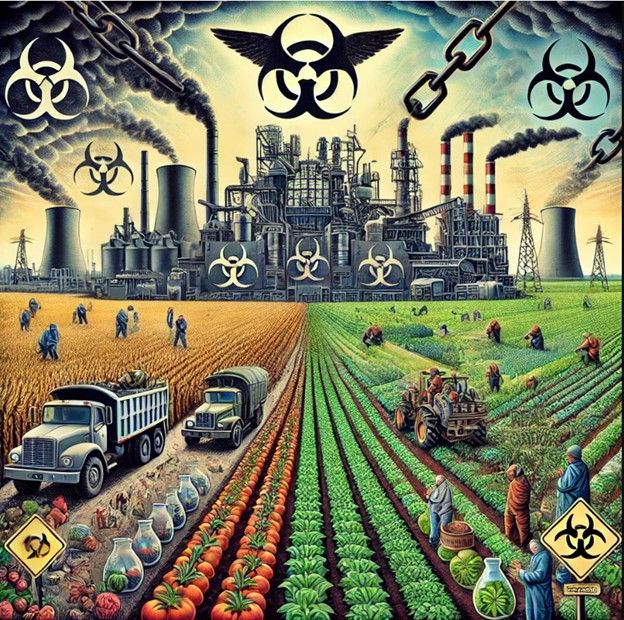Get the Military-Pharmaceutical-Industrial Complex Out of Food & Farming
Get the Military-Pharmaceutical-Industrial Complex Out of Food & Farming
INSTRUCTOR: Alexis Baden-Mayer, Esq.
FALL 2025
What does it say about the global food system that the biggest corporate players have roots in the military industrial complex and futures in technologies created for bioweapons and pharmaceuticals? In this course, you'll explore that question with a deep dive into the past and present of companies like Bayer-Monsanto. You'll learn the history of food technologies from the agrochemicals first used in World War I to the gene editing and synthetic biology techniques creating the latest Frankenfoods. In this course, you won't get stuck dwelling on the dystopian. You'll be brought into an inspiring movement of farmers and food sovereignty activists fighting for your right to real food.
Week 1: The Origins of the Agrochemical Giants
- Lecture Description: Explore the early 20th-century roots of today's agrochemical industries, tracing their development from World War I and their connections to figures like Rockefeller and companies like Bayer and Monsanto.
Reading list:
The War on Bugs by Will Allen
The Drug Story by Morris A. Beale
Week 2: The Nazi Legacy in Modern Agrochemicals
- Lecture Description: Uncover the disturbing history of Monsanto and Bayer, focusing on their connections to Nazi Germany.
Reading list:
The Crime and Punishment of I.G. Farben by Joseph Borkin
The Devil’s Chemists by Josiah E. Dubois, Jr.
Week 3: The Post-War Policy for Agriculture
- Lecture Description: The dramatic drop in the number of farms after World War II was the result of a carefully planned corporate strategy, infamously summed up by Nixon’s Agriculture Secretary Earl Butz as “get big or get out.”
Reading list:
Foodopoly by Winonah Hauter
Week 4: The Secret Military History of Monsanto
- Lecture Description: Monsanto’s role in the Manhattan Project, the post-war nuclear weapons industry at Mound Laboratories and the human radiation experiments, as well as the creation of the Defense Advanced Research Projects Agency.
Reading list:
Behind the Fog by Lisa Martino-Taylor
Week 5: Monsanto, Bayer and Agent Orange
- Lecture Description: The continuing health impacts of one of the most infamous chemical weapons of all time, as well as its reemergence in agriculture via 2,4-d and crops genetically engineered to resist it.
Reading list:
Seed Money by Bartow J. Elmore
Week 6: Synthetic Solutions and the War on Food
- Lecture Description: Investigate the history, going back to late 1800s, of efforts to replace natural food production with synthetic alternatives, analyzing the impact on the food supply and environment.
Week 7: The First Frankenfoods
- Lecture Description: How Monsanto evaded the safety-testing and labeling of its genetically modified foods.
Reading list:
Altered Genes, Twisted Truth by Steven Druker
Genetically Engineered Food: A Self-Defense Guide for Consumers by Ronnie Cummins and Ben Lilliston
Week 8: Bayer and Biodefense
- Lecture Description: We will look into the 2001 anthrax attacks and the role of Bayer's Ciprofloxacin.
Reading list:
The 2001 Anthrax Deception by Graeme MacQueen
Week 9: Monsanto and Mind Control
- Lecture Description: During the GMO labeling battles (2012-2016), Monsanto employed data scientists with expertise in artificial intelligence to investigate the manipulation of social media behavior, including with the use of brain-computer interfaces. There is a striking similarity between the finding of these studies and the “Disinformation Dozen” censorship campaign of the COVID era.
Reading list:
The Truth About COVID-19 by Ronnie Cummins and Dr. Joseph Mercola
Week 10: The Evolution of Agrochemicals into Biotechnology
- Lecture Description: Trace the advancements from traditional agrochemicals to modern biotechnology, including GMOs and CRISPR.
Reading list:
Nothing New in New GMOs – Gateway to Total Corporate Control by Navdanya International
Week 11: The Synthetic Food Revolution and Its Discontents
- Lecture Description: Explore the rise of synthetic food production and its acceptance in society.
Reading list:
The Problem with Solutions: Why Silicon Valley Can’t Hack the Future of Food by Julie Guthman
Week 12: Threatening the Future of Food
- Lecture Description: Monsanto and Bayer have long known that the poisons they peddle threaten to destroy the water, soil and pollinators needed to grow food into the future. Is this a bug or a feature? By design or blind greed?
Reading list:
The Fight Against Monsanto’s Roundup by Mitchel Cohen
The Myth of Safe Pesticides by André Leu
Toxic Legacy by Stephanie Seen
What's Making Our Children Sick by Michelle Perro and Vincanne Adams
Week 13: The Ethics of Innovation: Navigating Progress and Preservation
- Lecture Description: Explore the ethical considerations surrounding technological and scientific advancements, emphasizing ethical decision-making and public engagement.
Reading list:
Sowing Hunger, Reaping Profits – A Food Crisis by Design by Navdanya International
Week 14: Building Resilient Communities: From Theory to Practice
- Lecture Description: Focus on strategies for building sustainable communities that prioritize ecological balance and human well-being.
Reading list:
How Dare We? Courageous Practices to Reclaim Our Power as Citizensby Paul Cienfuegos
Maine Law Review Food Sovereignty Issue
Grassroots Rising by Ronnie Cummins
Week 15: Raising Consciousness for Regenerative Change
- Lecture Description: Reflect on the course's themes to discuss strategies for fostering regenerative, community-based solutions.
